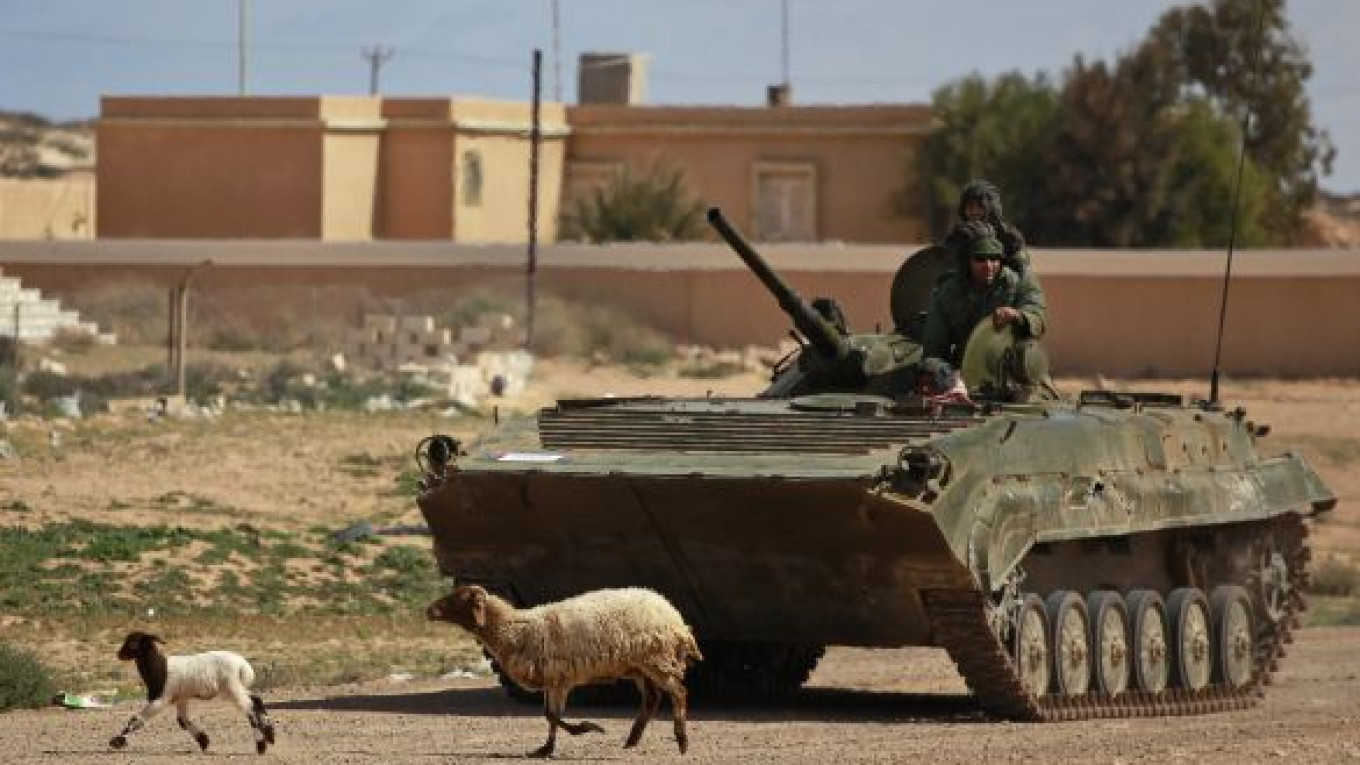UNITED NATIONS — Britain and France are preparing a UN Security Council resolution authorizing a no-fly zone over Libya, and diplomats said it would be tough but not impossible to get Russia and China's support.
Foreign Secretary William Hague said in London that Britain was working with other countries on a draft. Diplomats in Paris and New York said the work was being done by Britain and France in close consultation with the United States and Germany.
Hague told the British parliament that there were "credible reports" that Libyan government forces had used helicopter gunships against civilians as supporters of Moammar Gadhafi try to put down a revolt against his 41-year rule.
In Cairo over the weekend, French Foreign Minister Alain Juppe voiced support for a no-fly zone over the oil-producing North African state. "Assuming that the fighting becomes more lethal, we must prepare to respond," he said. "That's why we accepted the no-fly zone plan over Libya."
"For us, such an intervention can only be conceived, of course, under a UN mandate and with the participation of the Arab League and African Union," Juppe added.
Diplomats said a decision by France and Britain to submit a draft resolution to the 15-nation council would depend on whether certain "triggers" for action were met. These, they said, could include a marked deterioration of the humanitarian situation or mass aerial bombardments of civilian areas.
"We just want to be ready should the decision to launch negotiations on such a [no-fly zone] resolution be made so that we can make as rapid progress as possible," a diplomat said Monday.
Some envoys said the NATO alliance could be charged with enforcing the zone. NATO Secretary-General Anders Fogh Rasmussen has said the alliance would only do so if the UN Security Council authorized it.
The U.S. envoy to NATO, Ivo Daalder, said Monday that the alliance had begun 24-hour aerial surveillance of Libya. U.S. Defense Secretary Robert Gates has made clear that enforcing a no-fly zone would amount to military intervention.
Russia and China are permanent veto-wielding Security Council members that are generally reluctant to intervene in countries' affairs. But they have been careful not to oppose the African Union and Arab League, as shown by their recent support for UN sanctions against Gadhafi and his family.
The foreign ministers of Gulf states this week called for a no-fly zone to be imposed on Libya and for an urgent Arab League meeting to discuss the crisis there.
Foreign Minister Sergei Lavrov voiced opposition Monday for military intervention. But one council diplomat in New York said Lavrov's remarks fell short of a categorical denial of Russian support for a UN-backed no-fly zone.
"As long as he doesn't say 'no circumstances in which Russia would allow a no-fly zone' we're in business," the diplomat said. "I've seen worse from Lavrov."
Other diplomats said China would likely follow Russia's lead on Libya.
But Western diplomats said it would not be easy to persuade Russia and China to support the move. Moscow in particular has become increasingly annoyed with the UN secretariat and Western powers for taking sides against leaders in Ivory Coast, Egypt and elsewhere.
"The Russians clearly want to give non-military measures a try first before resorting to other steps," an envoy said, adding that Moscow and China could abstain rather than vetoing a no-fly zone resolution, allowing the measure to pass.
Diplomats said enforcing such a zone would not be easy. They pointed out that Libya has a much bigger landmass than Bosnia or Iraq, where previous zones were imposed in the past.
The Security Council authorized a no-fly zone for Bosnia from 1993 to 1995 to curb Serbian and Croatian airpower. The United States and Britain enforced a zone over Iraq after the 1990-91 Iraqi invasion of Kuwait, but without explicit council authorization.
A Message from The Moscow Times:
Dear readers,
We are facing unprecedented challenges. Russia's Prosecutor General's Office has designated The Moscow Times as an "undesirable" organization, criminalizing our work and putting our staff at risk of prosecution. This follows our earlier unjust labeling as a "foreign agent."
These actions are direct attempts to silence independent journalism in Russia. The authorities claim our work "discredits the decisions of the Russian leadership." We see things differently: we strive to provide accurate, unbiased reporting on Russia.
We, the journalists of The Moscow Times, refuse to be silenced. But to continue our work, we need your help.
Your support, no matter how small, makes a world of difference. If you can, please support us monthly starting from just $2. It's quick to set up, and every contribution makes a significant impact.
By supporting The Moscow Times, you're defending open, independent journalism in the face of repression. Thank you for standing with us.
Remind me later.






